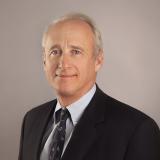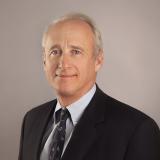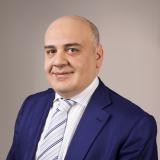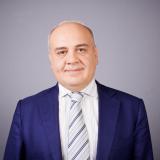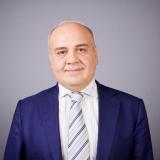2015 was an eventful year for GHG. The Company is well positioned to deliver on its strategy of doubling its 2015 healthcare revenues by 2018.
2015 was an eventful year for Georgia Healthcare Group. The Company successfully completed its public listing on the premium segment of the London Stock Exchange and raised US$100 million to fund its expansion plans.
I would like to thank all our new shareholders for their support throughout the process. The capital we raised supports our growth plans and our target to double 2015 healthcare revenues by 2018, while achieving c.30% EBITDA margin. This target will be achieved by expanding GHG’s market share in the hospital segment by number of beds from the current 27% level to c.30%. Following the IPO, GHG has already accelerated the complete renovation of two hospitals, and is in the process of rolling out a nationwide chain of ambulatory clinics – the first of its kind in the country – where GHG’s revenue market share is currently just 1% and its aim is to grow this to c.5% by the end of 2018. Introducing new services – treatments which are currently not available in Georgia – will be another contributor to this growth. The Company’s own growth plans are underpinned by the government’s ongoing initiatives to make healthcare more accessible to all Georgians. You will be able to read about how GHG aims to deliver on each of its strategic pillars later in this report.
In this letter I would like to focus on four key topics:
- Georgia turns 25;
- Expansion into pharmaceutical retail and wholesale business;
- Good governance leads to good returns; and
- Management make things happen.
In 2015 Georgia celebrated its 25th anniversary as an independent state. Although the country is over three millennia old, it was reborn when the Soviet Union collapsed in 1991. In its recent history Georgia has managed to transform itself from a corrupt and failed state into a young democracy with a rapidly growing economy, supported by a pro-business reforms. Over this period of time, GDP per capita has increased from US$500 to US$3,700 and, over the last 12 years, on the back of the reforms, real GDP has grown by average of 6%. Let me give you a brief summary as to why and how this has happened. Georgia’s independence in 1991 turned out to be a very expensive economic exercise. By 1995, Georgia’s real GDP collapsed to 28% of its 1990 level. This resulted in desperately poor and lawless society with no electricity, no gas, no heating, no telecommunication, no roads and no healthcare. In the 1990s Georgia also fought three civil wars and ended up losing 20% of its land. The second half of the 1990s was marked by declining crime rates, but also widespread corruption, weak state institutions and continued poverty. Therefore, people of Georgia demanded radical change and after the Rose Revolution in 2003, the new government managed to eradicate corruption and initiate pro-business reforms, among which was a reduction of the number of taxes from 21 to only six currently. In addition, the government embarked on a mass privatisation process while building strong state institutions. In 2016, the World Bank named Georgia as the top reformer globally over the past 12 years in its Ease of Doing Business Survey. The country ranks as one of the least corrupt in surveys done by Transparency International, and Trace International and Georgia is consistently ranked as the top performer in country policy and institutional assessments compiled by different organisations. Supported by a corruption-free environment and Ease of Doing Business reforms, the flow of foreign direct investment (FDI) has remained strong, standing at 9.7% of GDP in 2015. In 2012, Georgia took yet another important step towards strengthening its democracy. Following parliamentary elections the country experienced a democratic and peaceful transfer of power – for the first time in recent history. The Georgian Dream coalition won the election and promised a more independent judiciary, an even better business environment, free media and healthcare for the entire population. In three years, the new government has managed to deliver on its promises and its healthcare reform is widely regarded as one of the government’s biggest achievements. The newly appointed Prime Minister has put forth new reform initiatives to boost growth and accelerate foreign investments. These new reforms aim to reduce corporate profit tax to zero, invest more in infrastructure, invest in labour market-driven education and create a single touchpoint for corporates to deal with the government institutions – making it even easier to do business in Georgia. The leading political parties recognise the need for a good business environment to attract FDI, which investment continues to play a crucial role in the country’s success. FDI (Foreign Direct investment) has averaged 10.0% of GDP in the past ten years, and with its businessfriendly environment – ease of doing business, professional and independent state institutions, and a corruption-free environment – Georgia is firmly on the path to becoming the investment and services hub of the region. With visitor numbers growing from 560,000 in 2007 to nearly 6 million in 2015, Georgia has the potential to also become the financial and healthcare services hub of the region. In this very short period of time, the Georgian population has managed to develop and grow the country. I have been closely observing this remarkable transformation and the key take-away for me is the following: unless a corrupt and dysfunctional state goes fully bust, it is difficult to transform it. Once a transformation starts, it is difficult to stop it.
In March 2016 we announced one of our largest acquisitions and a move that marked our expansion into pharmaceutical distribution business. Initially, we did not actively plan to go into the pharmaceutical business Instead we worked on projects to independently secure and optimize our pharmaceutical supply chain for the hospitals, the ambulatory clinics and our medical insurance business. However, when an opportunity to acquire a pharmaceutical distributor presented itself, GHG’s management team saw this as a strategic fit and since they were able to conclude it on very attractive terms, this was to me and the Board a “must-do” deal. Subject to regulatory approvals, GHG signed a binding Memorandum of Understanding to acquire GPC, the third largest pharmacy chain in Georgia. This move supports our aim of being the leading integrated player in the Georgian healthcare ecosystem – a GEL 3.4 billion market. It positions GHG as the major purchaser of pharmaceutical products in Georgia. The acquisition price of GPC implies 5.7 times EV/EBITDA before eliminating unnecessary costs and capturing further cost and revenue synergies. Post-synergy this is reduced to 3.3 times. The pharmacy business will be highly synergistic both to reduce the cost of pharmaceuticals for our hospitals and medical insurance business as well as to crosssell through GPC’s loyalty programme. GPC has c.12 million customer interactions per annum, and a strong brand. GHG will open GPC pharmacies on the premises of its c.40 hospitals and large ambulatory clinics, which is expected to significantly boost the revenue of GPC. The move is strategic and I strongly believe it will create huge shareholder value going forward.
We at GHG, strongly believe that great institutions are only built with robust governance, and that, without it, they cannot deliver sustainable value for their shareholders. We think that a highquality, diverse and independent Board is extremely important for the success of the Company. We see the Board as an institution, which is not only performing its fiduciary duties of management oversight and strategy setting, but also providing guidance and coaching to our top and mid-level executive management team. In the case of GHG, the Board’s role of oversight is made relatively straightforward by naturally aligning the interests of the shareholders and the management team. To achieve this, we award long-term vesting shares (up to five years) to the management team and ensure that share compensation makes up a large proportion (e.g. 80-90%) of total annual compensation. In this way, we create a long-term alignment between the interests of the management team and the shareholders. If shareholders make money, the management team makes money and if the shareholders lose money, the management team also loses money. With this simple approach, in addition to being executives, the management team feels and acts more like shareholders – because they are. Out of nine Board members, seven are independent and six are non-BGEO Group members. The Board meets every quarter to discuss and set strategy, to approve key projects and transactions and to review and approve recommendations from the committees: Audit, Clinical, Remuneration and Nomination. We have a diverse Board. David Morrison is our Senior Independent Board member, who also chairs our Audit Committee. He is well aware of our fiduciary responsibilities, and regulatory obligations, and knows very well how checks and balances work in a public company. His long tenure at Sullivan and Cromwell serves him well in this regard. Neil Janin heads our Nomination and Remuneration Committees. His management consulting work for 25 years with McKinsey serves the GHG Board and management team very well. Neil spends time with the management team to help them brainstorm on different strategic issues and provides invaluable guidance. Neil’s management coaching skills and out-of-the-box thinking serve both the Board and the management well. Both Neil and David have an in-depth understanding of Georgia, as they have been Board members at the BGEO Group for the past 6 years. Tim Elsigood is our hospital guru. He has extensive experience of running hospital businesses in Western, Central and Eastern Europe, as well as in North Africa. Tim knows very well what works and what does not work in the hospital business, which makes it easy for us to understand the strategic priorities for GHG. Dr. Michael Anderson heads our Clinical Quality and Safety Committee. As a doctor, he has great input into how to improve the quality of our services. Ingeborg Oie, a healthcare research analyst and MD at Jefferies and a research analyst at Goldman Sachs, helps us to better understand investors’ ways of thinking and the Company’s long-term strategy. Jacques Richier, another independent director, is CEO of Allianz France. His input in making strategic decisions for our medical insurance business is critical. Allan Hirst’s extensive experience as CEO of Citibank in multiple countries helps us to better understand our government relations strategy. The Board is extremely motivated and engaged in making GHG a successful institution and ultimately creating strong value for shareholders.
Back in 2010 after the global financial crisis, Bank of Georgia’s intention was to divest its insurance subsidiary to raise capital. At the time Nick Gamkrelidze was CEO of our insurance company, Aldagi. Before making the decision to sell, the Board called in Nick to understand his plans in more detail. Nick presented the strategy of entering into the healthcare services sector, consolidating it and integrating it with our existing medical insurance business. The healthcare sector was ten times larger than the insurance sector and totally fragmented. The Board was convinced by Nick that investing in the healthcare business presented a much bigger opportunity than raising money from its divestment. Indeed, after embarking on the healthcare strategy, in less than five years Nick successfully led the transformation of a loss making company into a business with a market capitalization of US$350 million following last year’s successful IPO. Nick is a visionary leader, with great execution skills. He learns fast and develops even faster, and he has not been shy to surround himself with a team of top class executives. The management team of GHG is young, smart, energetic, and gets things done in a fast and efficient manner. The management team has demonstrated that it can grow the business organically as well as through acquisitions. In the past five years the management team has completed over 30 successful acquisitions and integrations. Identifying and eliminating unnecessary costs and extracting synergies is in the DNA of this organisation. In Georgia, we do not have middle names, but if GHG’s management team had one it would be “efficiency”. The management team at GHG is extremely motivated to develop themselves, the Company and the country’s healthcare system. Together with all the employees of GHG, they are not only building a great Company, but more importantly raising the standard of healthcare in the country. I am extremely honoured to have the opportunity to serve as Chairman of this great institution – one that we aim soon to be a billion Dollar company.
